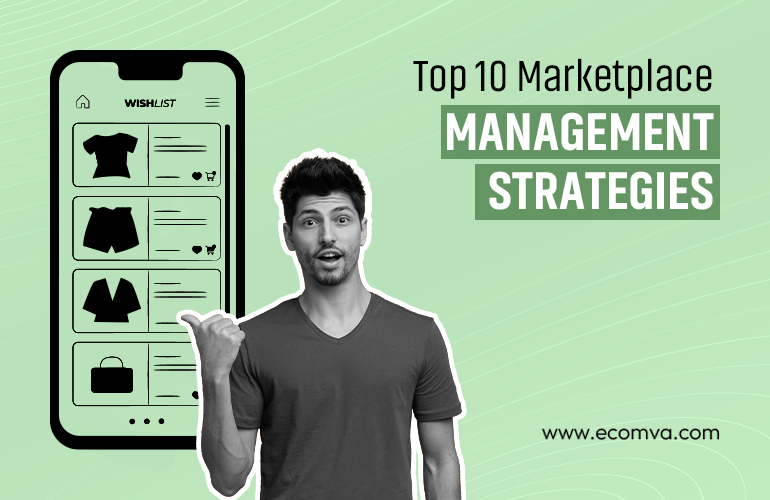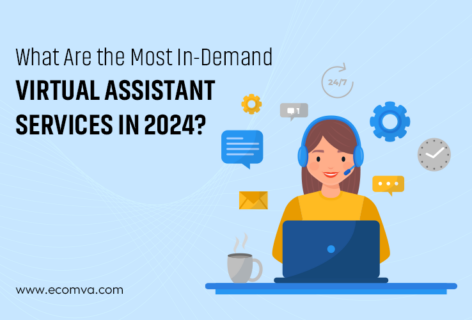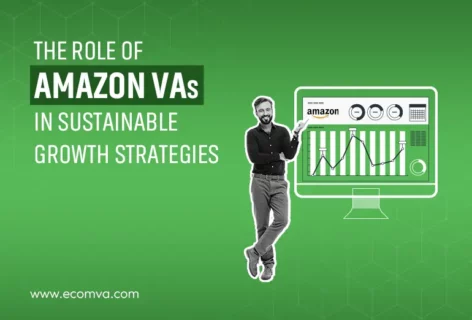Top 10 Marketplace Management Strategies To Minimize Your Challenges

As per a survey statistic for 2022, consumers spent more than $3.25 trillion across diverse online marketplaces, which shows the phenomenal growth of this industry. This means every business with an efficient eCommerce marketplace management will trigger immense growth and revenue.
Not just that, but with the right marketplace management strategies, you can expect to drive better engagement for the customers and also streamline the operations. But achieving such goals might not be as easy as it sounds! There is a need for you to master different aspects of running and managing the marketplace.
For instance, you will have to look after maintaining vendor relationships, meeting regulatory compliance, enhancing customer experience and much more. With everything perfectly aligned, you will be readying your marketplace to seamlessly handle intense transaction volumes and encourage positive consumer interactions.
But, amidst all of these inclusions associated with eCommerce marketplace management, you must also attain enough flexibility to adapt to the changing marketing conditions or consumer preferences at any point in business. That’s how you overcome the potential marketplace challenges.
So, if you are planning on starting your digital marketplace, it’s more than important for you to implement the right strategies in the process. So, this article will enlighten you with the ten most crucial marketplace management strategies for you to embark on for crafting a perfect business platform.
What is eCommerce Marketplace Management?
For any usual consumer, a marketplace is a visually crafted storefront that has a list of endless products for them to choose from. But at the backend, things function differently for you as the business owner. It’s because there is a need for you to look after the big network of algorithms or networks that the marketplace is built on.
And with just the standard approach, it is difficult to create a marketplace that will stand out in the crowd. You need outstanding marketplace management strategies and proper execution for them to ace in the industry. Efficient marketplace management is the process where you make some strategic calls or oversee your eCommerce platform.
The purpose is to maintain and grow the performance quotient of the marketplace and acquire more profitability in the long run. Some of the responsibilities associated with eCommerce marketplace management include:
Vendor Onboarding and Relations
It is the process where you have to attract, retain and also support your sellers throughout their time with you. Following that, managing the vendor relationships will also improve the quality & diversity of the products that you sell to the consumers.
Customer Acquisition & Retention
You ought to implement data-driven marketing and deliver personalized experiences to attract a strong customer base and acquire their loyalty to your brand.
Cybersecurity & Data Security
In the digital commerce sector, the importance of data protection and cybersecurity is paramount. Therefore, your eCommerce marketplace management efforts should be backed with strong and efficient security measures.
Performance Monitoring
You must keep a tab on the performance metrics and also make necessary adaptations to meet the needs of vendors and customers, ensuring productivity for your marketplace.
What are Some Challenges You Might Experience while Seeking Marketplace Management?
You can always hire dedicated virtual assistants to strategize your eCommerce marketplace management. But do you know the complex challenges that you will come across while leveraging the marketplace management opportunities?
Well, the virtual assistants you hire for executing your marketplace management strategies will be responsible for dealing with some unavoidable challenges. So, in order to understand how important it is to efficiently manage the marketplace, you must first get an idea of the potential challenges that might come up:
1. Customizing Marketplace Rankings & Listings
Different marketplaces come with unique ways to organize, rank and categorize the products. Therefore, you are required to tweak the product content depending on where you are planning to sell it. For instance, what works well on Amazon might not sell well on Flipkart.
2. Attaining Regulatory Compliance
If your digital marketplace tends to operate globally, it should comply with different laws and legal frameworks across varying jurisdictions. Ensuring compliance across borders might be a very complex task, but you must address it.
3. Maintaining Competitiveness
With the rising trends in the world of eCommerce, you must adhere to the trends at all times. For instance, the concept of Web3 is now being leveraged in the eCommerce sector and for creating marketplaces as well. You must keep up with integrating new technologies and features to keep your marketplace on the top.
These are just a few of the many challenges that you might experience while running an eCommerce marketplace. But, hiring the right virtual assistants to implement impactful marketplace management strategies is an efficient approach to overcoming all of these challenges.
What are the Strategies Your VAs Recommend for Better Marketplace Management?
Just like you hire a virtual assistant for Amazon Seller business or BigCommerce store management, some professionals can assist you if you intend to run an entire marketplace. In the quest, there are certain strategies that they might implement in order to help you run a profitable marketplace business, which includes:
1. Using Data Analytics
One of the crucial strategies for acquiring efficient marketplace management is to use data analytics. Your virtual assistants will help you determine user behavior, vendor performance and market trends. Based on this, the customer experiences can be personalized, and the marketing campaigns will be fine-tuned.
2. Integrate New Technologies
You must take the help of your VAs to implement new technologies, such as AI and blockchain. This way, you will be enhancing the capabilities of your marketplace. You can use generative AI, explainable AI and other such technology features to add more personalization to your marketplace offerings for end customers.
3. Improve Payment Processing
Even when you run just an online store over any of the marketplaces, you will have to prioritize easy payment processing. It is because streamlined payment is what delivers a good experience to the customers. Therefore, you can hire a virtual assistant to help simplify the payment processing aspects for your marketplace as well. This way, catering to the different audience groups with their preferred payment methods is quite easier.
4. Use Different Marketing Channels
Whether you hire a virtual assistant for an Amazon Seller business or for managing your marketplace, you will be advised to use diverse marketing channels for better outcomes. In the case of eCommerce marketplace place management, you can prefer using social media advertising, search engine marketing, email marketing and other such strategies.
5. Build Vendor Relationships
One thing that’s important in marketplace management is to build a better relation with the sellers or vendors. It means you must have a simple and easy onboarding process, allowing new sellers to experience no hassle in joining your marketplace. You must also provide the vendors with some tools to be able to list or manage their respective products with ease.
6. Encourage Better UX
Be assured that the UI for your marketplace to be intuitive and easy to navigate. Take the help of Amazon, Walmart, WooCommerce or BigCommerce store management VAs to help you integrate the best UI/UX for your marketplace. The experts will be helping you with faster load times, an easy checkout process and simplified navigation.
7. Seek More of Customer Interactions
You can encourage the customers on your marketplace to interact with your brand and share their bit of experiences with specific sellers. Let the eCommerce marketplace management VAs integrate reviews, forums and Q&A polls all across your marketplace at different instances to collect the experience feedback of customers about specific sellers of your marketplace services.
8. Adhere to the Local Preferences
If you have plans on making your marketplace operate on a global scale, you need to tailor it to adhere to local tastes. It is one of the best eCommerce marketplace management strategies where your VAs will be assisting you with localizing the platform with tailored design, product offerings, payment methods and language. When you align your marketplace to that of the local preferences, you can expect to attain better productivity.
9. Create a Good Revenue Model
Let your VAs dig deeper into the current revenue model and suggest adjustments to it, periodically. This way, you can ensure that your charges or fees stay relevant for the vendors, making the product offers more attractive for the customers. Collectively, having a planned revenue model will help your business be profitable.
10. Encourage Continuous Improvements
With the eCommerce industry changing constantly, there comes the need for you to constantly upgrade yourself to adhere to the market trends. Therefore, let your market placement management VAs recommend and integrate improvements to make sure your marketplace stays user-friendly and relevant.
Parting Words
These are the ten most crucial marketplace management strategies that can help you run a successful digital business free from common challenges. You don’t have to stick with just the basics while you are setting up a marketplace like Amazon or Walmart. As the competitiveness is high for the industry, you ought to try modern practices.
Therefore, take the help of professional VAs and let them integrate the best strategies to make your digital marketplace business grow stupendously.











